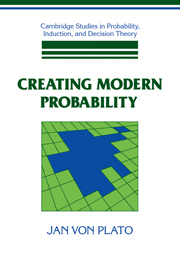Book contents
- Frontmatter
- Contents
- Preface
- 1 Introduction
- 2 Pathways to modern probability
- 3 Probability in statistical physics
- 4 Quantum mechanical probability and indeterminism
- 5 Classical embeddings of probability and chance
- 6 Von Mises' frequentist probabilities
- 7 Kolmogorov's measure theoretic probabilities
- 8 De Finetti's subjective probabilities
- Supplement: Nicole Oresme and the ergodicity of rotations
- Bibliography
- Index of Names
- Index of Subjects
4 - Quantum mechanical probability and indeterminism
Published online by Cambridge University Press: 05 June 2012
- Frontmatter
- Contents
- Preface
- 1 Introduction
- 2 Pathways to modern probability
- 3 Probability in statistical physics
- 4 Quantum mechanical probability and indeterminism
- 5 Classical embeddings of probability and chance
- 6 Von Mises' frequentist probabilities
- 7 Kolmogorov's measure theoretic probabilities
- 8 De Finetti's subjective probabilities
- Supplement: Nicole Oresme and the ergodicity of rotations
- Bibliography
- Index of Names
- Index of Subjects
Summary
PROBABILITY IN THE OLD QUANTUM THEORY
Probability was connected to quantum theory right from the start, in 1900, through the derivation of Planck's radiation law. But not much attention has been paid to the concept of probability in quantized radiation, or in the ‘quantum jumps’ from one energy level to another in an atom, and related problems. A whole chapter or book, instead of a section, could be written on the background of quantum theory in statistical mechanics and spectral analysis with this aspect in mind. Probabilistic properties were included in very many of the most important papers dealing with radiation between 1900 and 1925. It became also clear in time that Planck's law could not be derived from classical physics. Einstein admits this around 1908. Later he said, in a work of 1917, that it is a weakness of the theory of photon emission that ‘it leaves to “chance” the time and direction of the elementary processes,’ thereby, according to Pais (1982, p. 412), making explicit ‘that something was amiss with classical causality.’ It remains somewhat open how the origins and shifting interpretations of probability in the old quantum theory affected the acceptance of the probabilistic interpretation of the new quantum mechanics of 1925–1926, and of the indeterminism that found its confirmation in Heisenberg's uncertainty relation in 1927.
- Type
- Chapter
- Information
- Creating Modern ProbabilityIts Mathematics, Physics and Philosophy in Historical Perspective, pp. 142 - 163Publisher: Cambridge University PressPrint publication year: 1994

